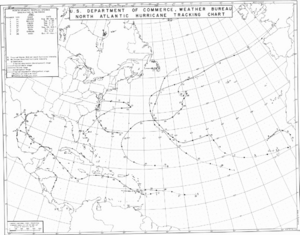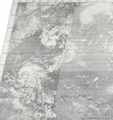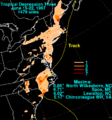1967 Atlantic hurricane season facts for kids
 |
|
| Season summary map | |
| First storm formed | August 28, 1967 |
|---|---|
| Last storm dissipated | October 31, 1967 |
| Strongest storm | Beulah - 923 mbar (27.26 inHg), 160 mph (260 km/h) – |
| 8 | |
| Total fatalities | 64 |
| Total damage | $217 million (1967 USD) ($1.24 billion, 2005 USD) |
| seasons 1965, 1966, 1967, 1968, 1969 |
|
The 1967 Atlantic hurricane season was a period when tropical storms and hurricanes formed in the Atlantic Ocean. It officially began on June 1, 1967, and lasted until November 30, 1967. These dates mark the time each year when most of these powerful storms usually develop. This season was about average, with eight storms forming in total.
Contents
Understanding the 1967 Hurricane Season
A hurricane season is a specific time of year when tropical cyclones are most likely to form. In the Atlantic Ocean, this period runs from June 1 to November 30. During the 1967 season, eight named storms developed. One of these storms grew into a major hurricane.
The Powerful Hurricane Beulah
Hurricane Beulah was the most important storm of the 1967 Atlantic hurricane season. It was an incredibly strong Category 5 hurricane. This means it had very high wind speeds. Beulah caused a lot of damage and sadly led to many deaths.
Beulah's Path and Impact
Hurricane Beulah caused about $217 million in damage in 1967. This amount would be over $1.2 billion in today's money (2005 US dollars). The storm was responsible for 58 deaths. Beulah first crossed the Yucatán Peninsula in Mexico. It then made landfall a second time near the mouth of the Rio Grande river. This river forms part of the border between the United States and Mexico.
Images for kids
-
Composite of ESSA 2 photographs showing hurricanes Beulah, Doria, and Chloe
 | Delilah Pierce |
 | Gordon Parks |
 | Augusta Savage |
 | Charles Ethan Porter |



